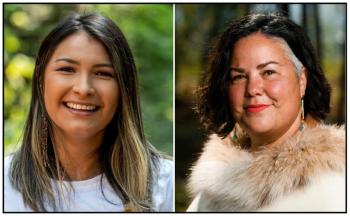Image Caption
Summary
Windspeaker.com Contributor
Sage Lacerte certainly has a concept that is unique. And now Lacerte, a member of Lake Babine Nation in British Columbia, will also have financial backing from the federal government to advance The Sage Initiative.
Lacerte is the founder and president of the only Indigenous women’s impact investment collective in Canada.
At a virtual press conference held Wednesday morning it was announced that The Sage Initiative is one of the first 10 grant recipients of the Advancing Indigenous Gender Equality through Innovation and Social Entrepreneurship Program.
The 10 grant recipients will receive $250,000 each for a total of $2.5 million. They were chosen to further Indigenous gender equality across health, economic and social areas.
The projects are either operated by or for First Nation, Inuit and Métis women, or two-spirit, queer or gender-diverse individuals.
This program was established in June 2019 when the federal government pledged up to $10 million to further Indigenous gender equality through innovation and social entrepreneurship.
The program is operated by the Indigenous Innovation Initiative and hosted by Grand Challenges Canada.
The Sage Initiative is recruiting Indigenous women, ages 18 to 29, from across Canada to offer training in investing in Indigenous social enterprises, up to $50,000 of their own money.
The goal is to provide a curriculum and learning environment which is intended to build financial and investment literacy for those looking to heal from previous money related traumas.
“Having my work recognized and chosen by the Indigenous Innovation Initiative is part of an important pivot in our country’s journey of economic reconciliation,” Lacerte said. “This grant will help empower Indigenous women and create a national ecosystem of Indigenous impact investors.”
Lacerte believes The Sage Initiative will provide a tremendous service.
The vision is to enable Indigenous women to become impact investors, “who make investment capital available to Indigenous-owned businesses,” she said. “This is revolutionary as Indigenous women have been intentionally excluded from the investment space by the settler society since the early days of contact.
“It’s long overdue for us to re-establish our matriarchal rights and roles and to rematriate our economy.”
Another project included in the first batch of grant recipients is the Dan K’ehte Natsedan (Learning Our People’s Way) venture, operated by Joella Hogan, the owner of Yukon Soaps Company.
Hogan, a member of Na-Cho Nyak Dun First Nation in Mayo, Yukon, plans to create a physical safe space for people and a mentorship program around plant-based businesses to support individuals to be able to build their own plant-based enterprises.
“For me, at the core of this innovation is that Dan K’ehte Natsedan, our traditional ways of knowing and being, can create abundance and that we will honour these ways (and) our economy can be regenerated to work for more people by supporting people in their creation of wellness products, developing their business and earning the income,” she said.
“My ultimate goal is to support the creation of the local regenerative economy while also creating an environment where we’re learning and living our core values of sharing, caring, teaching and learning.”
Hogan was thrilled to be one of the 10 grant recipients announced on Wednesday.
“Obviously (it’s) a huge, huge honour to be one of the northern recipients of this grant and to be able to support a project in my community like this and to continue to diversify our economy,” Hogan said.
Sara Wolfe, the director of the Indigenous Innovation Initiative, realizes the importance of not only the creation but also the funding of innovative projects.
“Innovation, as we all know, can help solve some of the most complex and intractable challenges in society,” she said. “It can drive change, it can transform lives, especially with an Indigenous context.”
Wolfe said almost 250 funding applications were received across the country for the Indigenous Innovation Initiative.
A campaign is currently underway to raise more funds in order to announce a second batch of grant recipients later this year.
Wolfe is pleased with the diversity of the inaugural grant recipients.
“This first group will create impact across diverse areas, including pre- and post-natal health, sustainable beauty, sustainable building, media, human sex trafficking and sex exploitation prevention, food sovereignty, advanced air mobility and economic development,” she said.
Maryam Monsef, minister for Women and Gender Equality and Rural Economic Development, believes Wednesday’s announcement of grant recipients is proof of the federal government’s commitment to assist equity seeking groups.
“In addition to the first 10 innovators that are being announced, the platform supports an Indigenous team, engages with Indigenous leaders, including the six leaders on the Indigenous Innovation Council, and works with Indigenous lead businesses to support fundraising, communications, and governance and strategy development,” she said.

